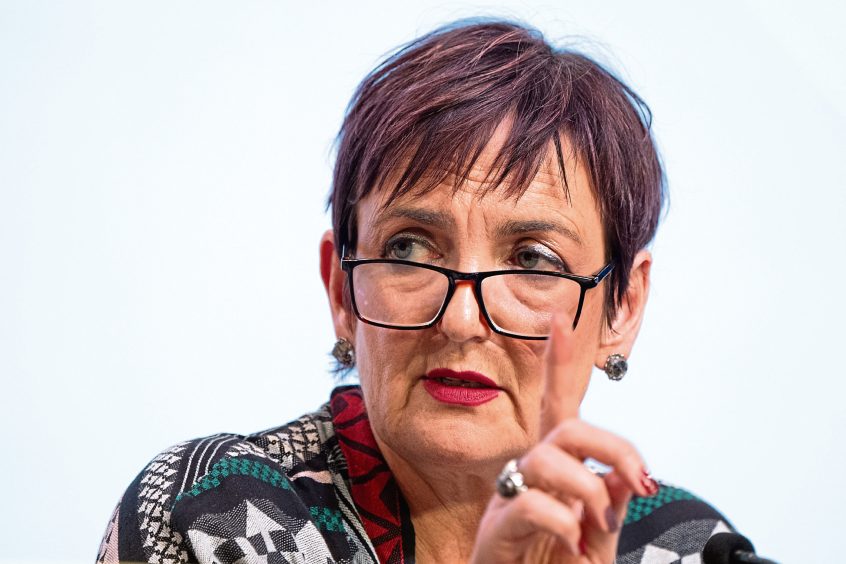
Scotland’s justice secretary has failed to take action for 14 months after being warned by industry leaders about flawed legislation that could prevent the families of overseas workers from cashing in life insurance policies if they die abroad.
Correspondence seen by The Sunday Post shows Angela Constance was made aware of the loophole, with direct reference to the insurance implications, by the director of leading global manufacturing company as early as December 2023.
We have also seen at least five further examples of the issue being raised to MPs and MSPs, who then brought the matter to Constance’s attention.
Among those examples are concerns raised by senior oil and gas workers, individuals who live part of the year abroad, and the family of a woman who works overseas.
In several instances, those receiving responses went on to say they had been left feeling unsatisfied and confused by the justice secretary’s position.
Scots being denied justice
We revealed previously how as many as 1,000 Scots families may have been denied answers over their loved ones’ death since change in the law in 2016.
Despite 5,700 inquests into deaths abroad taking place in England and Wales between 2019 and 2023, not a single one has been carried out in Scotland.
Campaigners say confusion over the term “ordinarily resident” to describe where a person spent their time before dying has made it impossible to pass the threshold for an equivalent hearing, known as a Fatal Accident Inquiry, to be held in Scotland.
The requirements for a person to be considered ordinarily resident are not defined in the Inquiries into Fatal Accidents and Sudden Deaths etc. (Scotland) Act.
It means people arranging to have their family members’ remains returned to Scotland are unknowingly locking themselves out of justice available in England and Wales.
But last week, union officials warned the situation could also present a crisis for businesses who rely on having workers stationed overseas.
They fear even the most comprehensive life insurance policies could be rendered useless in some cases, with the current rules preventing inquiries from being set up to help establish the cause of deaths.
What does Constance’s response say?
Dr Billy Milligan first attempted to raise the issue with SNP MPs Mhairi Black and Gavin Newlands, both of whom have now left parliament, before being redirected through their party colleague at Holyrood, George Adam.
Adam’s office then wrote to the justice secretary on the business leader’s behalf and forwarded on a response dated December 20, 2023.
Constance’s letter makes clear that despite the warning, ministers “do not intend to define ordinarily resident in legislation”.
It claims the current flexibility excludes a person with a temporary relationship with Scotland but includes those who are in the country on a semi-permanent basis, such as international students.
It also acknowledges that where a person is repatriated to England and Wales, there is “no requirement for the deceased to have been ordinarily resident and an investigation would be at the coroner’s discretion”.
Falling through the cracks
We reported previously on the case of Davy Cornock, who is fighting to have a definition of ordinarily resident enshrined in law following the death of his son, David, in Thailand in 2019.
The 63-year-old, of Ferryden near Montrose, remains convinced offshore worker David was murdered – a claim backed by private investigations – but because he was not considered ordinarily resident in Scotland, no inquiry was called into his death.
That is despite David voting and banking in Scotland, working for a company in Aberdeen, being registered with a local GP and having a mortgage.
The lack of answers meant David’s children in Brazil became homeless after they lost out on his property and any insurance pay out.
The family believes that if his body had instead been returned to England, money to support their future may have been available.
Scottish Conservative justice spokesman Liam Kerr said: “The problems faced by Mr Cornock’s family are heartbreaking.
“It is not an isolated issue that requires some warm words from the Scottish Government, however.
“And a number of industries are rightly worried about the repercussions on insurance costs for them and their employees working abroad.
“Angela Constance has been aware of it since late 2023.
“But all that has come back from the SNP is a promise they’ll get the justice secretary to look into it. But it doesn’t look like she ever has.
“It’s worrying the justice secretary hasn’t taken proper action to address this.
“It shouldn’t be up to individuals to seek a solution, when there should be an easy alignment with the rest of the UK in these matters.”
Government refuses to provide answers
The Sunday Post asked the Scottish Government what action, if any, was taken by the justice secretary after concerns were raised with her 14 months ago.
We also asked the government to explain why no inquiries have been held into the death of a Scot abroad since the new legislation was introduced in 2016, despite more than a thousand inquests taking place in England and Wales every year.
It failed to answer those questions and instead re-issued an old statement.
The statement said: “Our thoughts remain with any family who has lost a loved one in these circumstances.
“Fatal Accident Inquiries are a matter for the Lord Advocate, who exercises these functions independently of government.
“While it is the role of the Foreign, Commonwealth and Development Office to provide consular support, the Scottish Government is committed to identifying where support to families in Scotland can be improved.
“Any investigation into the circumstances of a death abroad rests with the authorities in the country where the death occurred. Without their significant co-operation it is unlikely to provide the answers that loved ones may be searching for.”

Enjoy the convenience of having The Sunday Post delivered as a digital ePaper straight to your smartphone, tablet or computer.
Subscribe for only £5.49 a month and enjoy all the benefits of the printed paper as a digital replica.
Subscribe © Jane Barlow/PA Wire
© Jane Barlow/PA Wire © Supplied by subject
© Supplied by subject © Mhairi Edwards
© Mhairi Edwards